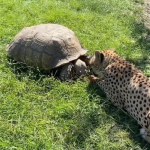When an Orphaned Elephant Chose Love

He hadn’t meant to fall asleep. His body ached from weeks of long nights and longer days, but exhaustion had finally caught him. Curled against his chest was a young elephant, her breath steady, her trunk resting gently across him like a child clutching a parent’s hand. In that rare stillness, he closed his eyes and let go.
This was no ordinary moment. This was trust—fragile, hard-earned, and deeply sacred.
She was the first orphaned elephant to accept him. Not because he coaxed her, not because he reached out first, but because he waited. Day after day, he stayed near. Sometimes sitting quietly, sometimes humming softly, never pushing, never demanding. Until one morning, she made her choice. She approached him, lowered herself at his side, and wrapped her trunk around him.
In response, he placed his hand gently on hers—not to hold, not to restrain, but to promise: “I am here. I will not leave you.”
That was the beginning.

The Weight of Loss
Elephants are creatures of family. They are born into tightly knit herds where every aunt, cousin, and grandmother helps raise the calves. Their lives are woven together by bonds so strong that even death is mourned with silence, tears, and ritual.
But for orphaned elephants—those who lose their mothers to poaching, conflict, or accidents—the world becomes terrifyingly empty. Without the constant touch of a trunk, without the reassurance of a mother’s presence, they fall into despair. Many refuse to eat. Many give up on life.
This young elephant had been on that edge. Afraid. Withdrawn. Alone.
Until him.
He didn’t see himself as a savior. He wasn’t trying to replace her mother, nor erase her grief. What he offered was something quieter: consistency. He showed up. He stayed nearby. He let her see, day after day, that not all was lost—that someone still cared.
And slowly, painfully, she began to believe it.
A Language Without Words
When she wrapped her trunk around him, it was more than a gesture. In the wild, elephants intertwine trunks as an act of intimacy, reassurance, and deep affection. For her to do this with a human was monumental.
And for him, it was humbling. He didn’t grab. He didn’t pull. He simply placed his hand atop her trunk, a quiet reply in the only language that mattered: patience, presence, and trust.
It was then that he realized—love is not bound by species. Love is not about ownership, or even understanding. It is about showing up, about listening without words, about being there when someone else’s world has collapsed.
More Than Survival

In time, the young elephant grew stronger. She began to eat again, to play again, to step into the world with cautious hope. What saved her was not food alone, not medicine alone—but connection. The sense that she was no longer alone in her grief.
And what saved him, in many ways, was her. Caring for her gave his days meaning. Her trust became his anchor, proof that gentleness still mattered in a world so often cruel.
Together, they discovered a truth deeper than survival: that healing happens in the space between two beings who refuse to give up on each other.
Side by Side, Heart to Heart
He remembers that first nap as clearly as if it happened yesterday. The warmth of her small body pressed against him. The rhythm of her breath, steady and safe. The silence of fear replaced by the silence of peace.
Man and elephant. Side by side. Heart to heart.
Because love has no boundaries. It speaks without words, without species, without condition. It speaks through presence. Through patience. Through trust.
And sometimes, the greatest act of love is simply this: to stay.











